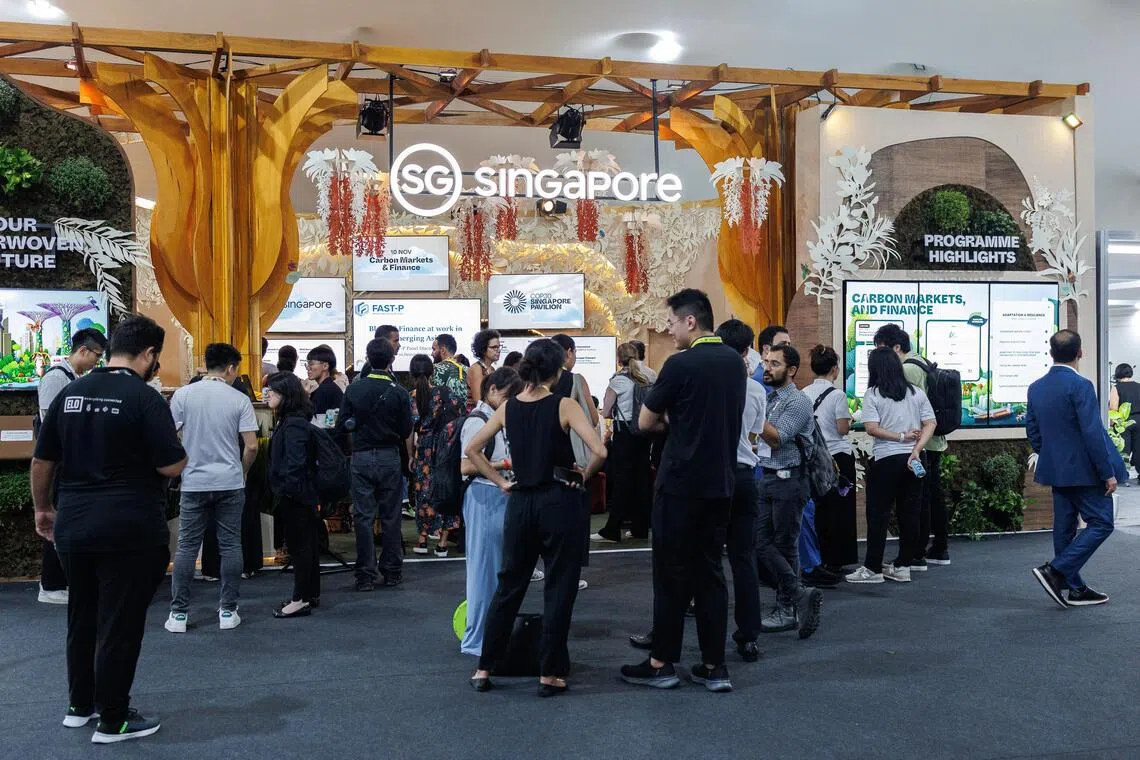Singapore backs global push for sustainable cooling as cities step up heat action at COP30
Sign up now: Get ST's newsletters delivered to your inbox

Cooling can be unsustainable when it relies heavily on electricity generated from fossil fuels, which contribute to planet-warming emissions.
ST PHOTO: BRIAN TEO
BELEM, Brazil – Singapore was among 185 of the world’s cities that pledged on Nov 11, the second day of the COP30 UN climate talks held in Brazil, to do more to curb unsustainable cooling practices that are fuelling rising temperatures across the globe.
Cooling can be unsustainable when it relies heavily on electricity generated from fossil fuels, which contribute to planet-warming emissions. Certain cooling devices also rely on refrigerants, some of which are powerful greenhouse gases.
A UN Environment Programme (UNEP) report released on Nov 11 showed that planet-warming greenhouse gas emissions from the rapidly growing demand for cooling could more than triple by 2050, resulting in more extreme heat events.
At current rates, emissions from cooling could overwhelm power grids and lead to an estimated 7.2 billion tonnes of planet-warming carbon emissions by 2050, despite existing efforts to improve energy efficiency and phase away pollutive refrigerants, the report found.
Singapore’s Minister for Sustainability and the Environment, Ms Grace Fu, said the Republic will share its technical expertise and experience in sustainable cooling and urban heat resilience.
Ms Fu was commenting on Singapore’s position on the launch of a new UN initiative at COP30, dubbed the Beat the Heat implementation drive, which aims to localise sustainable cooling measures.
The country has, for instance, rolled out an initiative to coat Housing Board blocks in all HDB estates with heat-reflective paint by 2030
COP30 kicked off on Nov 10
The Brazil COP30 presidency and the UNEP’s Cool Coalition on Nov 11 announced that the 185 cities, including Singapore, Rio de Janeiro and Jakarta, will join the Beat the Heat initiative to localise a plan to reduce cooling-related emissions by 2050.
The coalition is a unified effort of governments, cities, businesses and civil society that share the objective of advancing sustainable cooling.
“Extreme heat is one of the clearest signals of climate inaction, but it is also an area where solutions exist, are affordable, and can be scaled rapidly,” said COP30 president Andre Correa do Lago.
“(The initiative) is an opportunity to accelerate on-the-ground solutions for heat resilience and equitable access to sustainable cooling where it matters most: in the streets, schools, workplaces and homes.”
Underscoring the heat crisis was a directive at COP30 from the Brazilian presidency to relax the dress code for the summit, allowing participants to don smart casual wear to ensure comfort in Belem’s sweltering heat.

The Singapore Pavilion at the COP30 UN climate talks, which kicked off on Nov 10 in the Amazonian city of Belem, in Brazil.
PHOTO: XINHUA
The heat that hit a high of 32 deg C on Nov 10, the first day of the conference, had visibly unsettled some participants, with many seen fanning themselves as the air-conditioning system struggled to cope.
Ms Fu said Singapore will also look into creating platforms for countries to exchange knowledge and best practices.
This includes bringing together policymakers and practitioners from around the world to review progress made on the Global Cooling Pledge
Ms Fu said: “These concrete contributions to Beat the Heat reflects our commitment to advance practical, inclusive solutions for a cooler and more climate-resilient future.”
Singapore’s Ambassador for Climate Action Ravi Menon, who represented the Republic at the launch of the initiative, said that heat is not just a local nuisance, but also a systemic risk with global consequences.
He highlighted Singapore’s vulnerability to heat, with projections putting temperatures above 35 deg C nearly every day in 2100.
Mr Menon said: “Beat the Heat is precisely the vehicle the world needs: a mechanism to turn pledges into implementation, to de-risk investment, and to diffuse scalable solutions across countries.”
Energy needed to power artificial air-conditioning generates about 4 per cent of global greenhouse gas emissions, a 2022 study found. In Singapore, buildings account for more than 20 per cent of Singapore’s carbon emissions, with air-conditioning being a key contributor to building energy consumption.
Nearly two-thirds of cooling-related emissions can be brought down, the UNEP report said, should countries ramp up passive and low-energy cooling solutions, and phase down highly pollutive refrigerants.
Examples of passive cooling measures include creating spaces for shading, ensuring proper ventilation, and integrating more greenery into cities.
The UNEP report also found that only 54 countries have comprehensive policies to ensure sustainable cooling, with the largest gaps in African and Asia-Pacific countries, where much of the global rise in demand for cooling is anticipated.
If the report’s recommendations are adopted, UNEP said the solutions can improve cooling for three billion more people by 2050, save US$17 trillion (S$22.1 trillion) in cumulative energy costs, and avoid up to US$26 trillion in grid investment through reduced electricity demand.
“As deadly heatwaves become more regular and extreme, access to cooling must be treated as essential infrastructure alongside water, energy and sanitation,” said UNEP executive director Inger Andersen.
“But we cannot air-condition our way out of the heat crisis, which would drive greenhouse gas emissions higher and raise costs.
“Passive, energy-efficient and nature-based solutions can help meet our growing cooling needs, and keep people, food chains and economies safe from heat as we pursue global climate goals,” she added.



